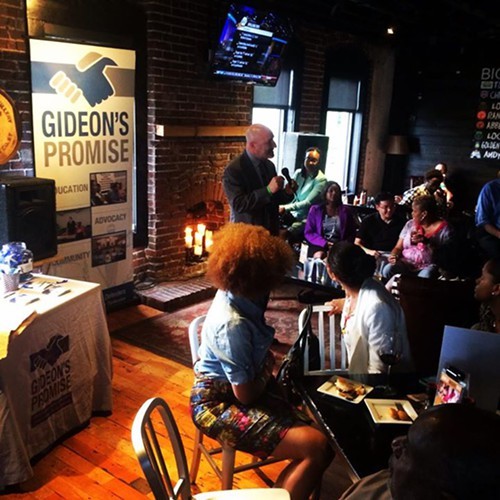America loves a comeback story, except when it’s ex-offenders seeking redemption after they’ve served their time. For these men and women, a criminal record often stands between them and a job, an apartment, or a loan. Although they’re no longer behind bars, they’re not free.

But last week, a new nonprofit organization committed to criminal justice reform brought emancipation to a few people.
In one of its first official actions, Just City wrote six $450 checks to cover the expungement fee for six people who’d completed the process to have their records wiped clean.
The Clean Slate Fund covered the cost through a grant from the Mid-South Peace & Justice Center and the Memphis Bar Association.
“One of Just City’s core values is that you should not be defined by the worst thing you’ve done,” Kerry Hayes, one of the organization’s co-founders, said.
Of the six Clean Slate Fund recipients, three were first-time offenders convicted of theft of property under $500, said Josh Spickler, director of the Defender’s Resource Network for the Shelby County Public Defender’s Office.
After they served jail time and paid monthly probation fees and court costs that may have totaled more than $1,000, another hurdle awaited: an expungement fee that rivals the amount of property that they’d taken.
“These are shoplifting cases, and then they’re stuck, because $450 is rent,” Spickler said.
Helping ex-offenders reintegrate into society isn’t a conservative solution or a liberal solution, Hayes said. It’s just common sense.
“This is an investment we’re making in the lives of people who want to work, who do want to contribute to society, but for $450, they would probably be unable to do that,” Hayes said.
I wasn’t able to talk to any of the people who had their records cleared. It defeats the purpose of getting a fresh start if your name or identifying characteristics show up in the paper, Hayes said.
The motivations of some who want their records expunged were sometimes more psychological than practical, Spickler said. “I was just really surprised about how many people have wanted it for peace of mind,” he said. “They feel like they’re marked. And what we see and know about people who have been in contact with the criminal justice system is they are marked.”
In 2012, the National Association of Criminal Defense Lawyers (NACDL) issued a report denouncing the “vast, half-hidden network” of collateral consequences that create a second-class status for the 65 million Americans who have a criminal record.
In Tennessee, a felony conviction means you can’t vote. You can’t work as a home inspector or reflexologist. You can’t be a security guard at the mall. You can’t even sell fireworks.
In 2012, the state legislature amended the expungement law, but it’s still so narrowly tailored that few ex-offenders qualify. Of the 10 recommendations issued by NACDL, number nine is exactly what Just City and the Shelby County Public Defender’s Office has done.
“Defense lawyers,” the NACDL wrote, “should consider avoiding, mitigating, and relieving collateral consequences to be an integral part of their representation of a client.”
The city of Memphis adopted a “ban the box” ordinance in 2010, but Shelby County and most private employers still ask job applicants about their criminal record.
“Some of these people are 20 years out of this mistake, and we still force them to answer this question this way,” Spickler said.
In late July, Just City held its inaugural event to introduce the organization to Memphis — and to ask the question: What is a just city?
“We titled it that so we would not give you an answer,” Hayes told the audience at Hattiloo Theatre. “What we want is for you to start asking the question with us … because when you start to ask the question, everything around you will change.
“If we believe that expectations create reality, which we do, it starts with having a different set of expectations for ourselves and our city. If justice is going to mean anything to any one of us, it’s got to mean absolutely everything to every one of us.”

